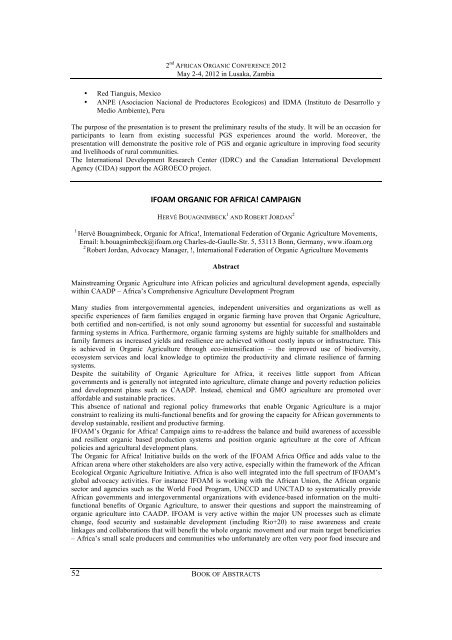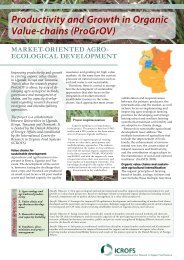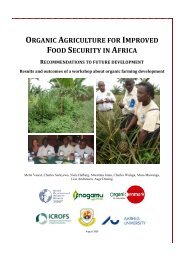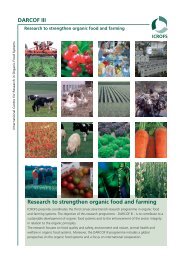The 2nd African Organic Conference â Mainstreaming ... - ICROFS
The 2nd African Organic Conference â Mainstreaming ... - ICROFS
The 2nd African Organic Conference â Mainstreaming ... - ICROFS
Create successful ePaper yourself
Turn your PDF publications into a flip-book with our unique Google optimized e-Paper software.
2 nd AFRICAN ORGANIC CONFERENCE 2012<br />
May 2-4, 2012 in Lusaka, Zambia<br />
• Red Tianguis, Mexico<br />
• ANPE (Asociacion Nacional de Productores Ecologicos) and IDMA (Instituto de Desarrollo y<br />
Medio Ambiente), Peru<br />
<strong>The</strong> purpose of the presentation is to present the preliminary results of the study. It will be an occasion for<br />
participants to learn from existing successful PGS experiences around the world. Moreover, the<br />
presentation will demonstrate the positive role of PGS and organic agriculture in improving food security<br />
and livelihoods of rural communities.<br />
<strong>The</strong> International Development Research Center (IDRC) and the Canadian International Development<br />
Agency (CIDA) support the AGROECO project.<br />
IFOAM&ORGANIC&FOR&AFRICA!&CAMPAIGN&<br />
HERVÉ BOUAGNIMBECK 1 AND ROBERT JORDAN 2<br />
1<br />
Hervé Bouagnimbeck, <strong>Organic</strong> for Africa!, International Federation of <strong>Organic</strong> Agriculture Movements,<br />
Email: h.bouagnimbeck@ifoam.org Charles-de-Gaulle-Str. 5, 53113 Bonn, Germany, www.ifoam.org<br />
2<br />
Robert Jordan, Advocacy Manager, !, International Federation of <strong>Organic</strong> Agriculture Movements<br />
Abstract<br />
<strong>Mainstreaming</strong> <strong>Organic</strong> Agriculture into <strong>African</strong> policies and agricultural development agenda, especially<br />
within CAADP – Africa’s Comprehensive Agriculture Development Program<br />
Many studies from intergovernmental agencies, independent universities and organizations as well as<br />
specific experiences of farm families engaged in organic farming have proven that <strong>Organic</strong> Agriculture,<br />
both certified and non-certified, is not only sound agronomy but essential for successful and sustainable<br />
farming systems in Africa. Furthermore, organic farming systems are highly suitable for smallholders and<br />
family farmers as increased yields and resilience are achieved without costly inputs or infrastructure. This<br />
is achieved in <strong>Organic</strong> Agriculture through eco-intensification – the improved use of biodiversity,<br />
ecosystem services and local knowledge to optimize the productivity and climate resilience of farming<br />
systems.<br />
Despite the suitability of <strong>Organic</strong> Agriculture for Africa, it receives little support from <strong>African</strong><br />
governments and is generally not integrated into agriculture, climate change and poverty reduction policies<br />
and development plans such as CAADP. Instead, chemical and GMO agriculture are promoted over<br />
affordable and sustainable practices.<br />
This absence of national and regional policy frameworks that enable <strong>Organic</strong> Agriculture is a major<br />
constraint to realizing its multi-functional benefits and for growing the capacity for <strong>African</strong> governments to<br />
develop sustainable, resilient and productive farming.<br />
IFOAM’s <strong>Organic</strong> for Africa! Campaign aims to re-address the balance and build awareness of accessible<br />
and resilient organic based production systems and position organic agriculture at the core of <strong>African</strong><br />
policies and agricultural development plans.<br />
<strong>The</strong> <strong>Organic</strong> for Africa! Initiative builds on the work of the IFOAM Africa Office and adds value to the<br />
<strong>African</strong> arena where other stakeholders are also very active, especially within the framework of the <strong>African</strong><br />
Ecological <strong>Organic</strong> Agriculture Initiative. Africa is also well integrated into the full spectrum of IFOAM’s<br />
global advocacy activities. For instance IFOAM is working with the <strong>African</strong> Union, the <strong>African</strong> organic<br />
sector and agencies such as the World Food Program, UNCCD and UNCTAD to systematically provide<br />
<strong>African</strong> governments and intergovernmental organizations with evidence-based information on the multifunctional<br />
benefits of <strong>Organic</strong> Agriculture, to answer their questions and support the mainstreaming of<br />
organic agriculture into CAADP. IFOAM is very active within the major UN processes such as climate<br />
change, food security and sustainable development (including Rio+20) to raise awareness and create<br />
linkages and collaborations that will benefit the whole organic movement and our main target beneficiaries<br />
– Africa’s small scale producers and communities who unfortunately are often very poor food insecure and<br />
52<br />
BOOK OF ABSTRACTS





